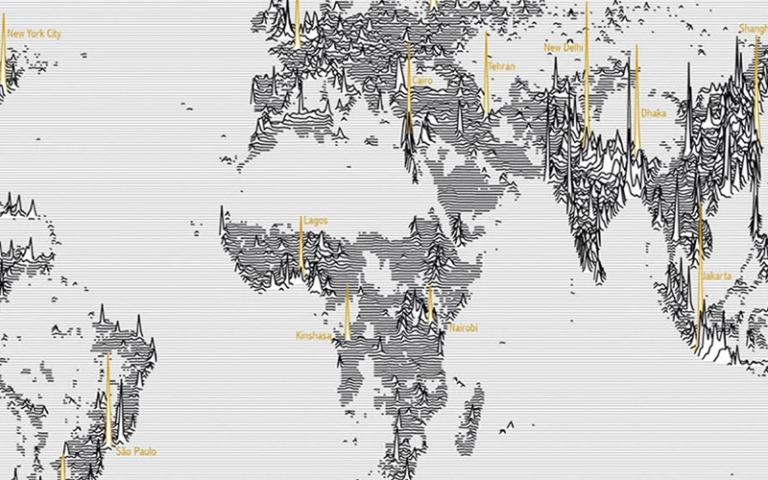How UCL’s ‘Big Data’ research has overhauled policy and practice
From the ethnic-variant impacts of COVID-19 to improving urban transport planning, UCL’s ground-breaking research into consumer data is transforming policy, practice and planning decisions.

12 April 2022
What is now understood as Geographic Information Systems (GIS) research was established in UCL Geography in the 1970s.
Building upon this formative legacy, the UCL Geospatial Analysis and Computing (GSAC) group are world leaders in applying geospatial techniques to analyse human behaviour using large and complex data sets.
Improving international data usage
GSAC’s main contributions to the field in recent years are three-fold. Firstly, their research has improved data-mining techniques and capability allowing them to tap into global and national networks and databases and other data sources.
They have developed data licensing agreements with more than 30 external partners and software interfaces to obtain and use geospatial data.
Mapping the changes in local communities
Secondly, GSAC research has recognised both the shortcomings of conventional demographic classifications of neighbourhoods, and the potential of consumer data to improve them.
The group has developed innovative methods to link consumer data with administrative data, analysing this to improve understanding of changing individual activity patterns, household structures, and neighbourhood attributes over time.
Shaping policy on social inequality
Thirdly, by working with business, government and the third sector to acquire the data, they carry out analysis and linkage to segment it based on where people live and their demographic profile (known as geodemographic data).
They then interpret and visualise the data cartographically to answer questions relating to social inequalities. Their work has equipped people working in the public, private, education and research sectors with unique products, classification approaches and visualisation tools that have shaped policy, practice and planning decisions in the UK and beyond.
The Greater London Authority (GLA), for example, commissioned GSAC to build a classification system, London Output Area Classification (LOAC), to capture the distinctive characteristics of the London population, particularly in terms of its ethnic structure. LOAC has helped the GLA to pinpoint areas that were rapidly becoming more densely populated and plan for public services, as well as helping to forecast the number of school places that would be needed.
Transport for London also used LOAC, in combination with its own survey data, to discover who is living in London, their travel preferences, how amenable they would be to change and what might be effective in persuading them to change their travel choices.
This has fed into the Mayor of London’s Transport Strategy 2017-41, the ‘Liveable Neighbourhoods Scheme, Healthy Streets Check’ and cycling infrastructure model.
Providing invaluable data during COVID-19
At the outbreak of the COVID-19 pandemic, it was suspected that some ethnicities fared worse than others from the infection in terms of outcomes and deaths. Professor Paul Longley (UCL Department of Geography) collaborated with the Welsh Government and Public Health Wales using the GSAC names classification software to fill in missing ethnicity information and examine ethnic variations in outcomes for patients hospitalised with COVID-19 – ultimately revealing that ethnic minorities had increased risk of hospital admission but not a greater likelihood of dying.
The UK Government Joint Biosecurity Centre also used GSAC’s classification approach, as its Programme Manager explained: “As COVID-19 impacts people from different ethnicities in very different ways, the UCL data has been invaluable in helping us protect different communities through gaining a deeper understanding of the relationship between ethnicity and the spread of the virus.”
International and local appeal
GSAC’s publicly available Bike Share Map synthesises and visualises global bike share systems in real time, helping city authority and transport operators to plan their operations, and in some cases, such as in San Francisco, providing the only way for operators to know how many bikes are out and which docking stations are full.
Furthermore, GSAC’s DataShine maps, which visualise 2011 Census data, have shaped regeneration and engagement activities at local clubs in Birmingham, and helped decide allocation of funding to sustain grassroots football clubs, and supported Geography teachers to get up to speed with using interactive maps and online data.
Research synopsis
Data mapping, analysis and visualisations for policy and practice
Research by the UCL Geospatial Analytics and Computing (GSAC) group has unlocked the power of consumer ‘Big Data’, providing data products, classification approaches, and visualisation tools. These outputs have been used to inform policy, practice and planning decisions. The range of benefits from this research have included analysis of the ethnic-variant impacts of COVID-19 for health agencies, improved urban transport planning, widened participation in sports scheme investments, and enhanced use of mapping in secondary school education.
Project team: Paul Longley, James Cheshire, Oliver O’Brien, Jens Kandt
Links
- Professor Paul Longley’s Academic Profile
- Professor James Cheshire’s Academic Profile
- Mr Oliver O’Brien’s Academic Profile
- Dr Jens Kandt’s Academic Profile
- London Output Area Classification system
- London’s Transport Strategy
- DataShine Census maps
- The Geospatial Analytics and Computing Research Group
- UCL Department of Geography
- UCL Social & Historical Sciences Faculty
- UCL Social & Historical Sciences Faculty REF 21
 Close
Close

